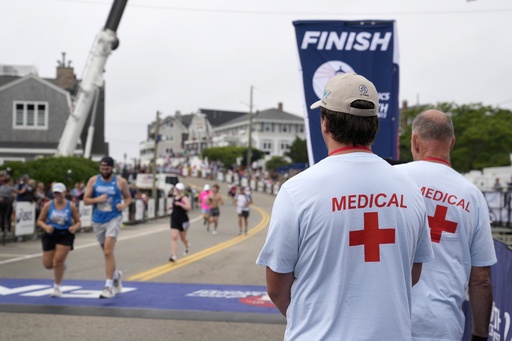Carolyn Baker, wearing vibrant neon attire, had a frightening experience during the Falmouth Road Race on Cape Cod. As she neared the finish line, she collapsed due to extreme heat, causing her internal temperature to spike to nearly 107 degrees Fahrenheit. Medical responders quickly placed her in an ice water tub for treatment.
Her family first noticed something was wrong when they saw her tracking app indicating she was moving backward on the course. Her husband, alerted by their daughter, rushed to the medical tent where Baker was being treated. Heatstroke, a dangerous condition exacerbated by rising temperatures due to climate change in the U.S., poses severe risks.
Exertional heatstroke can occur during intense exercise, leading to a body temperature above 104 degrees Fahrenheit and potentially causing fainting or blackouts. Immediate cooling is crucial, but many races lack the resources to provide proper care, and some runners may overlook warning signs due to a culture valuing toughness.
Muscle breakdown, organ damage, and even death can result from heatstroke. The 7-mile Falmouth race presents a high risk, attracting over 11,000 runners, some of whom may not be adequately prepared for hot conditions. While Falmouth is equipped to handle such cases, many races lack the necessary resources.
To effectively treat heatstroke, victims need rapid cooling, ideally achieved through immersion in ice water within 30 minutes of symptoms onset. However, few races have the infrastructure to address heat-related emergencies, emphasizing the need for industry-wide safety standards.
Both race organizers and runners play a role in mitigating heatstroke risks. Proper medical care, hydration, and awareness of one’s limits are essential. Athletes like Carolyn Baker and young runner Evan Hauptmann provide cautionary tales of the dangers of heatstroke, while emphasizing the importance of learning from such experiences to prevent future incidents.
While racing may slightly elevate the risk of rare events like heatstroke, the overall health benefits of running overshadow these concerns. Despite the challenges faced by individuals like Zoë Wallis, who endured severe heatstroke during a college basketball run, recovery and resilience are possible with time and support.
Carolyn Baker’s determination and swift treatment led to her safe recovery, serving as a reminder of the significance of heat-related precautions. Her return to the Falmouth Road Race signifies resilience and a commitment to personal well-being in the face of potential dangers.
This website uses cookies so that we can provide you with the best user experience possible. Cookie information is stored in your browser and performs functions such as recognising you when you return to our website and helping our team to understand which sections of the website you find most interesting and useful.
